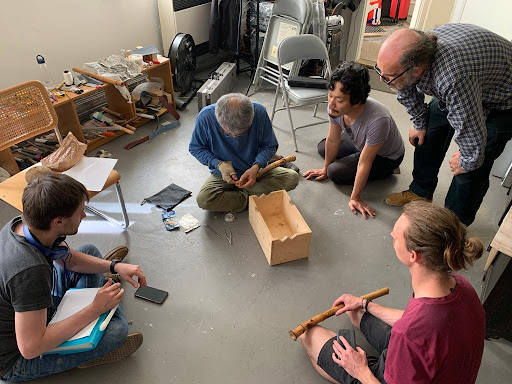
6. – 8. June, 2023
Kinya Sogawa is a shakuhachi player and maker whose playing bridges worlds of traditional and contemporary music. He creates his own instruments and his unique sound speaks to international audiences through concerts and famous Hollywood productions. His deep understanding of the instrument makes the shakuhachi and its music accessible to audiences of all ages. He studied shakuhachi performance with Katsuya Yokoyama who premiered Toru Takemitsu’s seminal work November Steps. Sogawa studied shakuhachi making with the legendary Chikuzen Tamai, the father of the modern shakuhachi.
You can hear Kinya Sogawa’s flutes on stage in the hands of Japanese and international masters such as Kifu Mitsuhashi, Ryozan Sakata, Teruhisa Fukuda, Dozan Fujiwara, Riley Lee, Bruce Huebner, Ned Rothenberg and many others.
Outside of being a shakuhachi maker, Kinya Sogawa is an extraordinary shakuhachi player who focuses on the spiritual repertoire honkyoku and contemporary music. His flutes are made with such high standards to meet requirements of both of these genres.
Over three days, you will be cutting, drilling and filing bamboo under the supervision of a master maker to make a jinashi shakuhachi. Kinya Sogawa will show you and help you how to precisely shape the bore and fix the problems your instrument may have. Under Sogawa’s guidance, you can make a jinashi shakuhachi from start to finish (as much as time permits), or you can bring a semi-finished shakuhachi into the workshop to finish it under his supervision.
You will be provided with the necessary making tools, but you are welcome to bring your own. You can either order a prime bamboo blank from Sogawa’s own storage. There will be three pieces available, each for the price of 10,000 Yen. Or, you can use one of his free rootend blanks with unusual length or node placement (lengths 2.0 to 2.8). While they might not conform to aesthetic standards these blanks will provide for a playable instrument.
The workshop capacity is six people only, because of this makers of all levels are welcome, even absolute beginners. There will be enough time for everyone.
Kinya Sogawa is a member of ORA-J, Japanese ensemble of Orchestra Asia. http://www.ora-j.com
Former member of Pro Musica Nipponia.
Personal website: http://www.fides.dti.ne.jp/sogawa/englishpage1.html?fbclid=IwAR2QBcd-onyxNkP5kPWXC30tQDSQ4fSxJszAaJklxlPoxltJbE-gEIfw858
Conditions:
To ensure an intensive experience, the workshop is open to 6 participants only.
All sales of participation fees are final and cannot be refunded; the only exception being the cancellation of the event as a whole, in which case all payments for participation will be refunded in full latest by 31. 12. 2023. The organizers do reserve the right to alter the program of the event if necessary. By paying for the ticket or pass you agree to this policy.
Standard fee (including 1 bamboo blank): 9000 CZK
Apply at: info@neiro.org
Bamboo:
Kinya Sogawa can provide the workshop participants with one bamboo blank per person. These bamboo blanks are coming from Sogawa’s own storage and have unusual length or node placement. While they might not conform to aesthetic standards these blanks will provide for a playable instrument.
There will be three high quality bamboo pieces available from Sogawa’s bamboo storage that will cost 10,000 Yen a piece.
Please send request to info@neiro.org
Of course, you can bring your own bamboo or a semi-finished shakuhachi.
Schedule:
June 6 – 8, 2023
Tuesday, June 6th
10:00 Introduction
10:30 start of teaching
12:00 lunch (75 minutes)
17:00 end of teaching
Wednesday, June 7th
10:00 start of teaching
12:00 lunch (75 minutes)
17:00 end of teaching
Thursday, June 8th
10:00 start of teaching
12:00 lunch (75 minutes)
16:00 end of teaching
Notes:
If you have your own favorite set of tools, you are welcome to bring them. Standard drills, files and saws will be provided.
Bring a case for your new flutes.
The workshop will be conducted in English.
In case you need more time to finish your flute you can use our studio and tools outside of the workshop hours (on June 6th and 7th).
The shakuhachi making workshops are organized by NEIRO Association Expanding Arts, adjacent to the ISFP 2023. They are not part of the festival’s program and the Festival SuperPASS does not apply to the making workshops.
NED ROTHENBERG about Kinya Sogawa
KINYA SOGAWA is one of the most outstanding shakuhachi performers in Japan today, and is also one of Japan’s finest shakuhachi makers. As both a brilliant musician and craftsman, he is a rare gem within the shakuhachi world. In the years before World War II, the best shakuhachi players were also the best shakuhachi makers, but since the latter 20th century these roles diverged as the demands required for each increased. In this sense, Kinya Sogawa represents a renaissance of the true spirit of the master shakuhachi artist.
As a performing artist, Mr. Sogawa is active in an extraordinarily wide range of traditional and contemporary music. While his core focus remains the solo repertoire of traditional pieces passed down by the komuso wandering monks of the Edo Period, he is also one of Japan’s prominent performers of contemporary music. In the 1990s he was a leading member of the acclaimed ensemble Pro Musica Nipponia where he received an award for technical excellence. Since 1993 he has been a member of the acclaimed Orchestra Asia and is a soloist for the orchestra’s Japan Team. With both of these ensembles he has toured frequently in Europe and Asia. In addition, he is one of Japan’s foremost shakuhachi performance and recording artists for the popular singing style known as enka. He also frequently performs and records for theater, television dramas, and commercials. His music for the opening sequence inYasunori Mitsuda’s computer game, “Chrono Cross”, was designated “best video game music of all time” by America’s Hardcore Gaming 101 in 2011.
Born in Kobe, Mr. Sogawa studied the shakuhachi with Katsuya Yokoyama, one of the 20th century giants of music in Japan, and he was apprenticed to master shakuhachi craftsman Chikusen Tamai. In addition to his professional performance and instrument making activities, he has been deeply engaged with the development of a curriculum in traditional music for the Japanese system of public schools.
